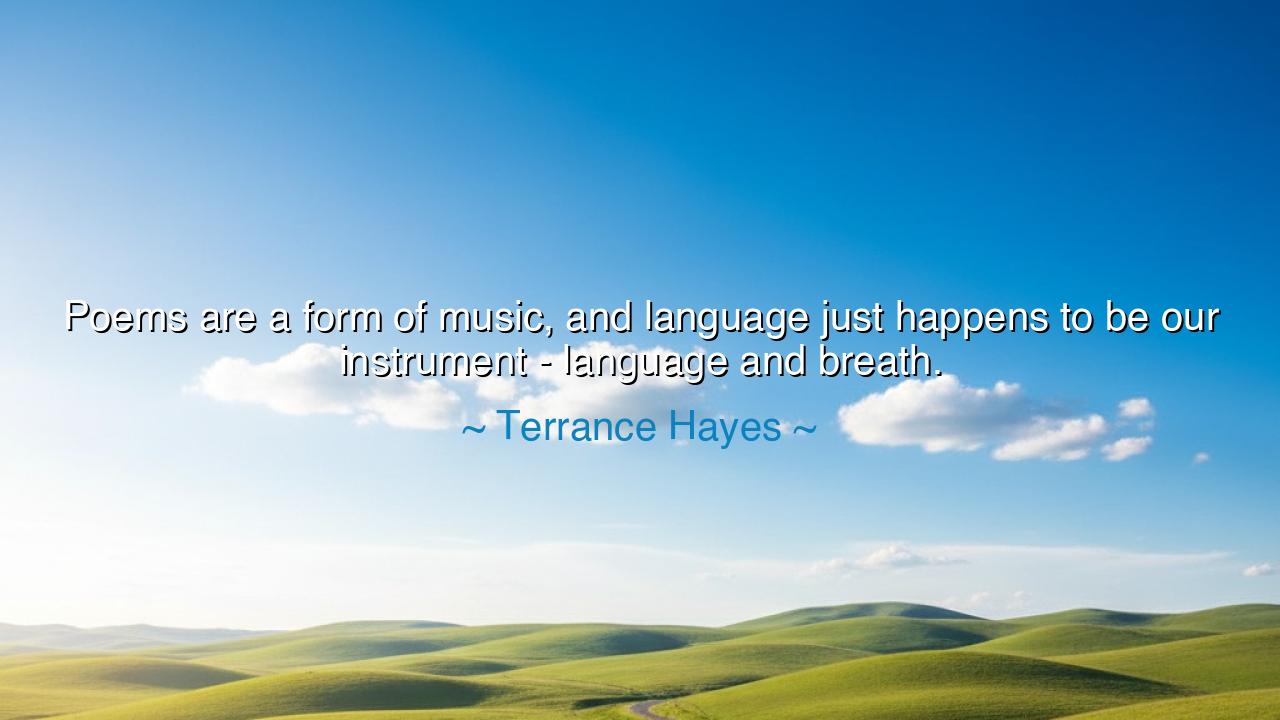
Poems are a form of music, and language just happens to be our
Poems are a form of music, and language just happens to be our instrument - language and breath.






Hear the words of Terrance Hayes, poet and seer, who declared: “Poems are a form of music, and language just happens to be our instrument—language and breath.” In this saying lies a truth older than nations, older even than writing itself. For poetry and music are not two arts, but one; both are born from rhythm, both from sound, both from the pulse of the human spirit. Language is our instrument, and breath is the force that gives it life. Without breath, words are silent. Without rhythm, words are lifeless. Together, they become poetry, which is music carried upon the human tongue.
To speak of poems as music is to remember the beginning of civilization, when before there was writing, there was chant. Ancient bards did not recite their verses as we read them today; they sang them, they let them rise and fall with melody. The Homeric epics, carried by memory through centuries, were not merely lines of text, but songs sustained by breath. Even scripture, in its earliest recitations, was delivered in rhythm and tone, for the ancients knew what Hayes reminds us: that poetry is not read, but heard, not seen, but felt in the body as music.
This truth is illuminated in history’s great voices. Think of Maya Angelou, whose poems were not simply written lines but performances of rhythm, cadence, and soul. When she spoke, the words became melody; her language and breath carried more than meaning—they carried power, evoking both song and sermon. She did not play an instrument of strings or keys, but her very breath was her music, her voice her instrument. It is through such examples that Hayes’ words find their origin.
Or recall the great griots of West Africa, the keepers of memory, who told the histories of their people not with scrolls but with song. Their poems were music, their voices instruments. Their breath carried the heritage of generations, and their rhythm bound communities together. When Hayes speaks of language as instrument, he stands in this ancient lineage, reminding us that poetry, like song, has always been an act of survival, a way to keep memory alive.
The meaning of Hayes’ insight is thus: do not separate poetry from music, for they are kin. A line of verse is like a note, a stanza like a chord, a poem like a symphony. The poet arranges sound not only for sense, but for feeling—for the way syllables strike the ear, the way rhythm moves the body. In this, the poet is a musician, though his instrument is invisible, made of air and breath. And we, as listeners and readers, are invited to hear not only the message, but the music hidden within each word.
The lesson for us is clear and radiant: treat your words as music. When you speak, do not merely inform, but let your language and breath carry tone, rhythm, and care. When you write, attend to the sound of your lines as much as their meaning. For a truth spoken musically strikes deeper than one spoken flat. Just as a song lingers in the heart long after it ends, so too will your words endure if they are given as music.
And what must you do, O seeker? Listen closely. Read poems aloud, and hear the music within them. Practice your own words, not only with logic but with rhythm. When you speak to others, let your voice rise and fall as though you were singing a small song. Remember that in every breath you carry an ancient power, the power to bind language to music, and music to the soul.
Thus, let the wisdom of Terrance Hayes echo within you: “Poems are a form of music, and language just happens to be our instrument—language and breath.” Treasure your words, craft them like notes, breathe them like song. For in doing so, you join the great chorus of humanity, whose poetry has always been music, and whose music has always been the breath of life itself.






AAdministratorAdministrator
Welcome, honored guests. Please leave a comment, we will respond soon